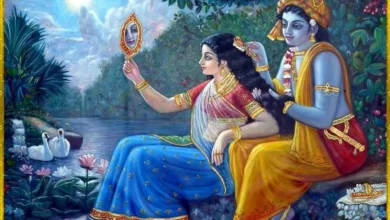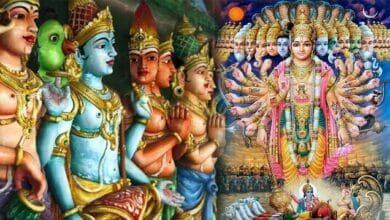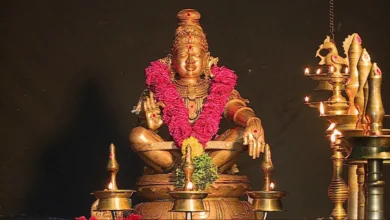The Incredible Secrets of Lakshman That Even Lord Ram Didn’t Know

Introduction: A Devotion Beyond Imagination
Have you ever wondered what true sacrifice really looks like?
When we think of the Ramayana, Lord Ram’s righteousness takes center stage. But hidden in the epic’s pages is a story so profound that it redefines the meaning of devotion itself. This is the story of Lakshman—a brother whose sacrifice was so extreme that it remained unknown even to Lord Ram for fourteen long years.
What if I told you that Lakshman didn’t sleep a single night during the entire exile? Or that he never ate even one morsel of food? Sounds impossible, right? Yet this is exactly what happened, and when the truth finally came out, it left everyone—including Lord Ram—absolutely stunned.
Let’s dive into these incredible secrets that showcase why Lakshman deserves to be celebrated as one of the greatest warriors and devotees in Hindu mythology.
Who Was Lakshman? The Warrior Behind the Scenes
Before we explore his secrets, let’s understand who Lakshman truly was.
Lakshman was the younger brother of Lord Ram and the son of King Dasharatha. When Ram was exiled to the forest for fourteen years, Lakshman didn’t hesitate for even a moment. He left behind his wife Urmila, the comforts of the palace, and his royal duties to serve his elder brother.
But here’s what makes this even more remarkable: Lakshman’s sacrifice went far beyond just accompanying Ram into exile. His devotion reached levels that even the gods found extraordinary.
Secret #1: Gudakesh – The One Who Conquered Sleep
The Meaning Behind “Gudakesh”
The term “Gudakesh” literally means “one who has conquered sleep.” While many know Arjuna by this title, few realize that Lakshman was the original Gudakesh. He achieved something that seems humanly impossible—he stayed awake for fourteen continuous years.
The Divine Bargain with Nidra Devi
When the trio—Ram, Lakshman, and Sita—departed for their forest exile, Lakshman made a crucial decision. He approached Nidra Devi, the goddess of sleep, with a heartfelt request.
His reasoning was beautifully simple yet profound: “If I sleep even for a moment, how will I protect my brother and sister-in-law? How will I ensure their safety in these dangerous forests?”
Nidra Devi was moved by his devotion but explained that sleep is a fundamental necessity. Someone had to bear the burden of his sleep.
The solution? Lakshman’s wife, Urmila, would sleep for both of them back in Ayodhya.
Think about this for a moment. While Lakshman stood guard in the forest, Urmila slept continuously for fourteen years in the palace. This wasn’t just Lakshman’s sacrifice—it was a shared sacrifice of an entire family.
Why This Matters
Lakshman’s conquest over sleep wasn’t about proving his strength. It was about pure, unconditional service. Every night for fourteen years, while dangers lurked in the forest, Lakshman remained vigilant. He was the silent guardian, the unwavering protector who never let his guard down.
Quick Takeaway:
- Lakshman remained awake for 14 years straight
- Nidra Devi granted him this boon
- His wife Urmila slept for both of them
- This made him “Gudakesh”—the conqueror of sleep
Secret #2: The Mystery of the Uneaten Food
Fourteen Years Without a Single Meal
If staying awake for fourteen years sounds incredible, here’s something even more shocking: Lakshman didn’t eat anything during this entire period either.
Every day, Lord Ram would lovingly give Lakshman fruits and food in a leaf bowl (dona). And every day, that food would disappear. Ram naturally assumed his brother had eaten it. But the truth was far more extraordinary.
The Grand Revelation in Ayodhya’s Court
The secret remained hidden until after the victory over Lanka, when the entire family returned to Ayodhya. During a grand celebration in the royal court, as tales of their adventures were being shared, Guru Vashishtha dropped a bombshell.
“O Ram,” the sage announced, “Lakshman has not eaten a single morsel of food in these fourteen years.”
Can you imagine Ram’s reaction? He immediately protested: “Guruji, I myself gave him food every day in leaf bowls. The food was never left uneaten. How can this be true?”
The sage simply replied, “Only Lakshman can solve this mystery.”
The Pile of Dona: Physical Proof of Devotion
Lakshman humbly explained his secret. Using his spiritual powers, he would instantly transport the food back to Ayodhya. Every single leaf bowl, every morsel, was preserved.
“Come with me, brother,” Lakshman said. “I’ll show you where I’ve kept all the food you gave me.”
When they reached the storage place, everyone was astounded. There stood a massive pile of leaf bowls—fourteen years’ worth of daily meals, preserved and untouched.
The Four Missing Bowls
But here’s where the story gets even more touching. When Ram counted the bowls, he found they were four short.
“Where are the four missing bowls?” Ram asked with concern. “Did you eat on those four days?”
Lakshman’s answer brought tears to everyone’s eyes:
The Four Days Lakshman Didn’t Receive Food:
- Day of Departure: When they left Ayodhya for exile, Ram was too grief-stricken to eat, so he didn’t give food to Lakshman either
- Death of King Dasharatha: When news came of their father’s passing, Ram fasted in mourning
- Sita’s Abduction: The day Ravana kidnapped Sita, Ram was too distraught to think of food
- Lakshman’s Injury: When Lakshman was struck by the Shakti weapon and lay unconscious, Ram couldn’t eat due to worry
These four missing bowls represented the four times Ram’s own pain was so intense that he forgot to eat—and therefore, Lakshman didn’t receive food either.
The Deeper Meaning: What Lakshman’s Sacrifice Teaches Us
Beyond Physical Endurance
Lakshman’s story isn’t just about supernatural abilities. It’s about the depth of devotion and service. In our modern lives, we often struggle to sacrifice even small comforts for those we love. Lakshman gave up the two most basic human needs—sleep and food—for fourteen years.
The Power of Selfless Service
Think about your own life for a moment. When was the last time you truly put someone else’s needs completely before your own? Not for a day or a week, but consistently, without expecting anything in return?
Lakshman’s example shows us that true devotion doesn’t seek recognition. He never mentioned his sacrifice to Ram. It was only revealed by Guru Vashishtha after everything was over.
Family Sacrifice: Urmila’s Role
We can’t discuss Lakshman’s sacrifice without acknowledging Urmila. She slept for fourteen years so her husband could serve his brother. This reminds us that great acts of devotion often have unsung heroes supporting them from behind the scenes.
Key Points to Remember:
- True devotion doesn’t seek recognition
- Sacrifice is often a family affair
- Service to others can take extraordinary forms
- The greatest warriors are also the greatest devotees
Why This Story Matters Today
Relevance in Modern Times
You might be thinking, “This is an ancient story. How does it apply to my life?”
Here’s how: We live in an age of instant gratification. We want recognition for every small good deed. We struggle to stay committed when things get difficult. We prioritize our comfort above all else.
Lakshman’s story challenges all of that. It asks us:
- Can we commit to something truly important for the long term?
- Can we serve without expecting immediate rewards?
- Can we support our loved ones even when it requires personal sacrifice?
Lessons for Daily Life
You don’t need to give up sleep or food to practice Lakshman’s principles. Here are practical ways to apply his wisdom:
- Be Present: When helping someone, be fully present—no distractions, no divided attention
- Consistent Support: Show up for people consistently, not just when it’s convenient
- Quiet Service: Do good without broadcasting it on social media
- Long-term Commitment: Stick with your commitments even when the initial excitement fades
- Family First: Sometimes the greatest success is supporting a family member’s dreams
The Historical and Spiritual Context
Variations in the Ramayana
Different versions of the Ramayana emphasize different aspects of Lakshman’s devotion. The Valmiki Ramayana, the Ramcharitmanas by Tulsidas, and regional variations all celebrate Lakshman’s unwavering loyalty.
While the specific details about not sleeping or eating appear more prominently in folk traditions and regional retellings, the core message remains consistent: Lakshman’s devotion was extraordinary and complete.
Symbolism in Hindu Philosophy
In Hindu philosophy, Lakshman represents the ideal disciple and the perfect karma yogi—one who acts selflessly without attachment to results. His character teaches us that true strength lies not in seeking glory but in dedicating oneself completely to a higher purpose.
Ram’s Reaction: A Brother’s Love
When the full truth finally came out, Lord Ram was left speechless. Here was his younger brother, who had sacrificed everything, and Ram hadn’t even known about it.
This reveals something beautiful about both brothers. Lakshman’s devotion was so pure that he never needed acknowledgment. And Ram’s love was so genuine that discovering his brother’s suffering deeply affected him.
The story reminds us that the people who love us most might be making sacrifices we never notice. It encourages us to be more aware, more grateful, and more appreciative of those who support us silently.
Conclusion: The Legacy of True Devotion
Lakshman’s secrets teach us that the greatest acts of love often happen in silence. His fourteen-year vigil, his conquest over fundamental human needs, and his unwavering dedication set a standard for devotion that transcends time and culture.
Whether you view this story as historical fact, spiritual allegory, or inspiring mythology, its message remains powerful: true devotion requires sacrifice, and the greatest sacrifices are often those made without seeking recognition.
Call to Action: Who in your life has been your “Lakshman”—silently supporting, consistently showing up, asking for nothing in return? Take a moment today to acknowledge them. Sometimes the greatest gift we can give is simply recognizing the sacrifices others make for us.
Final Thought
The next time you think of the Ramayana, remember that behind every great leader stands an even greater supporter. Lakshman’s story proves that devotion and sacrifice are not about grand gestures witnessed by thousands, but about daily choices made in quiet commitment to those we love.
What sacrifice are you willing to make for someone you love? How can you embody even a fraction of Lakshman’s devotion in your daily life?
Follow us on x.com
Discover more from Sanatan Roots
Subscribe to get the latest posts sent to your email.



Your point of view caught my eye and was very interesting. Thanks. I have a question for you.
Thanks for sharing. I read many of your blog posts, cool, your blog is very good.